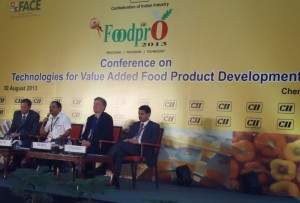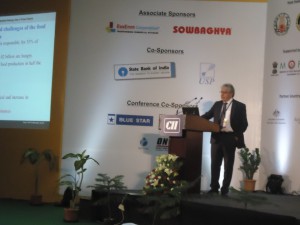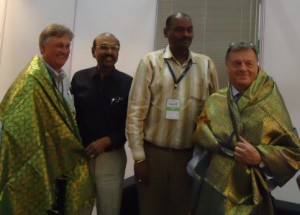12th September 2013 New Delhi, India
Processing food tie ups
The demand for high quality, safe, nutritious processed foods will continue to increase as the global population and affluence increases. In India, the same trends have resulted in significant growth and changes in the food processing industry.
 Considering this sector’s immediate potential for growth of the economy, the Government of India is indeed focusing towards food processing industry as a priority sector. The Confederation of Indian Industries, with support from India’s Ministry of Food Processing Industries, organised its biennial exhibition, ‘Foodpro’, in Chennai few days back. This was the 10th in the series.
Considering this sector’s immediate potential for growth of the economy, the Government of India is indeed focusing towards food processing industry as a priority sector. The Confederation of Indian Industries, with support from India’s Ministry of Food Processing Industries, organised its biennial exhibition, ‘Foodpro’, in Chennai few days back. This was the 10th in the series.
SIN arranged for the participation of a great delegation from the UK, which was particularly notable during the session on ‘Technologies for value added product development’ on the first day of the exhibition. Our experts delivered well received lectures on topics ranging from changing facing of food manufacturing to energy efficient refrigeration in the food chain and carbon saving processes in the supply chain.
 I found the concept of creating a ‘Formula 1 Supply Chain’ as suggested by Prof Pawar quite appealing. Also Prof Foster’s emphasis on manufacturing food that is nutritive was very assuring. The UK’s recently launched strategy for agricultural technologies clearly indicates provision of more choice for healthy, nutritious food to consumer as one of the beneficial outcomes of industry, science and Government partnership. Prof Tassou and Doug Marriott’s presentations on refrigeration in the food chain and carbon saving in food processing drew lot of interest from the audience. I could tell that energy efficiency in the processing systems is certainly a vital issue in this industry. Professor Tassou encapsulated this issue well during the launch of new National Centre for Sustainable Energy Use in Food Chains, at Brunel University, London, when he said “There is a global imperative to dramatically reduce carbon emissions across all heavy-use industries. It’s critical to start addressing energy efficiency in food chain systems now.”
I found the concept of creating a ‘Formula 1 Supply Chain’ as suggested by Prof Pawar quite appealing. Also Prof Foster’s emphasis on manufacturing food that is nutritive was very assuring. The UK’s recently launched strategy for agricultural technologies clearly indicates provision of more choice for healthy, nutritious food to consumer as one of the beneficial outcomes of industry, science and Government partnership. Prof Tassou and Doug Marriott’s presentations on refrigeration in the food chain and carbon saving in food processing drew lot of interest from the audience. I could tell that energy efficiency in the processing systems is certainly a vital issue in this industry. Professor Tassou encapsulated this issue well during the launch of new National Centre for Sustainable Energy Use in Food Chains, at Brunel University, London, when he said “There is a global imperative to dramatically reduce carbon emissions across all heavy-use industries. It’s critical to start addressing energy efficiency in food chain systems now.”
Foodpro provided us with an excellent opportunity to meet with participants from industry, academia and policy makers. With support from CII, we were able to have very productive interactions during these two days. With them we’ll explore what potential there is for UK-India research collaboration in this area. But it was clear during meetings with representatives from several Indian Institutes that there is a great appetite to work together and we hope to arrange a visit to some of their facilities before too long.
My colleagues Sashi and Vimal, from the British Deputy High Commission, Chennai, ensured that UK delegation had a very satisfactory visit and that they were able to make the most of this brief trip. So do watch this space – we will keep you updated as we look to develop UK-India links in this area!
Thank you Sunil for your interest in partnering with UK. It would be helpful to know which sectors are of interest to you.
Agreed . We PGBSA got many projects in India and Looking UK based group who can be our partners please send the details of the UK companies
thanks
Mgr kumar sunil partners PGBSA Mob 00919847762420